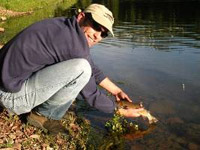Contact Us




Ecosystem Science and Management
Agriculture Building 2013
Department #3354
1000 E. University Ave.
Laramie, WY 82071
Phone: (307) 766-2263
Email: esm@uwyo.edu
Ecosystem Science and Management
College of Agriculture and Natural Resources
Timothy Collier
The main focus of my research, teaching and service/outreach is the use of biological control to suppress rangeland weeds. Biological control is the use of living organisms to suppress weed (or pest) populations. For many non-indigenous, invasive weed species, the main approach in biological control is to re-unite the weed with the specialized insect herbivores from the plant's native range. After careful screening, these insects are introduced to North America with the goal of reducing weed infestations through insect feeding. Another important goal in weed biological control is to avoid impacting other, so-called "non-target" species that might be attacked by the biological control agent, particularly plant species that are related to the target weed. I also am interested in the biological control of insect pests, specifically biological control using "parasitoids", small wasps (and flies) that develop on and kill other insects. Parasitoids may also be introduced from a pest's native range, reared en masse and released for pest control, or "conserved" through agricultural practices.
Research Interests
- Plant nutrients and host selection in plant-feeding insects, including weed biological control agents (more information)
- Integrating biological control and herbicides for suppression of Dalmatian toadflax and Canada thistle (more information)
- Nutritional ecology of parasitoid wasps (more information)
Teaching
- ENTO 4300/5300, Applied Insect Ecology.
- ENTO 4884/5884, Insect Behavior.
- RNEW 5985 Invasive Species Ecology Seminar
International Activities
Service and Outreach
My service and outreach involves education and implementation of biological control of weeds in Wyoming. Two main implementation projects I am involved in are biological control of Salt cedar and Dalmatian toadflax. I have also been working toward gaining permission from the USDA for introduction of two new biological control agents for Russian knapweed. Educational outreach includes a number of articles, a handbook and a pamphlet: Weed Biological Control in Wyoming.
Contact Us




Ecosystem Science and Management
Agriculture Building 2013
Department #3354
1000 E. University Ave.
Laramie, WY 82071
Phone: (307) 766-2263
Email: esm@uwyo.edu

